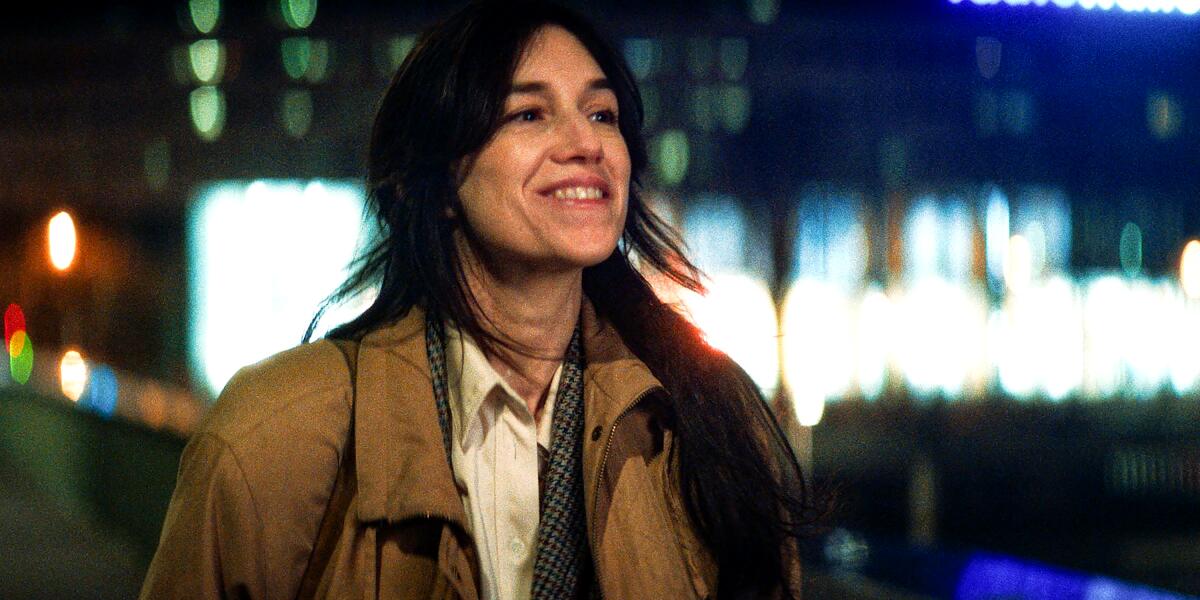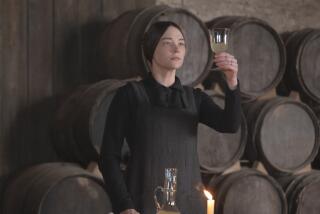Charlotte Gainsbourg navigates complex emotions in ‘The Passengers of the Night’

- Share via
A muted charmer in a decidedly French key, “The Passengers of the Night” suggests some operatic piece of exotic intrigue with that title, but is instead a subdued yet alert character study built around two broken women. Its center is a Parisian single mother finding her footing, played with an inviting emotionality by Charlotte Gainsbourg, while its satellite figure is a homeless teenager who enters the family’s orbit.
“Passengers” opens with footage of leftist joy in the streets over François Mitterrand’s election as president in 1981, before settling into its domestic concerns. Directed by Mikhaël Hers, who last gave us the soulful grief portrait “Amanda,” the movie takes place over several years in the 1980s, yet distinguishes itself not in the dramatic ups and downs of epic melodrama, but rather a quixotically low-key embrace of time’s healing march.
Just as essentially, the film manifests a patient belief in the narrative thrall of everyday decisions signifying human progress: a supportive word, an offer of help, an act of kindness and, conversely, what it means to be on the receiving end of such tenderness. It’s an unapologetically soft ride in the slice-of-life sweepstakes, flecked with era-specific archival footage as connective tissue, but with a sneaky, gathering poignancy that prioritizes the journey over story payoffs. (Hers wrote it with Maud Ameline and Mariette Désert.)
‘De Humani Corporis Fabrica,’ ‘Spider-Man: Across the Spider-Verse’ and ‘Stonewalling’ are among the favorites listed in our critic’s 2023 halftime report.
After that opening montage of election night good vibes, we shift to 1984, and the pall of uncertainty Gainsbourg’s Elisabeth lives under with her husband having absconded and two teenagers to provide for — poetry-loving high schooler Matthias (Quito Rayon-Richter) and his politically active older sister Judith (Megan Northam) — but also no job, and no work experience to help her land one. There is, however, her insomniac’s attachment to a late-night radio show compassionately spotlighting anonymous confessions from the awake and troubled. A fan letter earns Elisabeth a meeting with the show’s no-nonsense host Vanda (Emmanuelle Béart), who responds to this sensitive, longtime listener’s plight by immediately hiring her to screen for callers.
One of those is itinerant 18-year-old Talulah (Noée Abita), a runaway addict with kind eyes and a protective shell. Elisabeth takes to her plight, inviting her to stay in an unused space in their apartment — unspoken but beautifully hinted at in Gainsbourg’s luminous turn is that her enriching new job merits a paying forward of generosity.
The gesture introduces Talulah to a warm family environment (for the first time, we gather) and a belief things can get better. But it also sparks in aimless Matthias a desire for focused companionship beyond an adolescent’s baser urges. When Talulah offers to share a cigarette, and Matthias takes her to their building’s rooftop, for a few seconds they tower over the lighted city behind them — that kind of metaphoric visual isn’t new, but in Hers’ quietly caring attention to blooming connections it counts as an appealing transcendence.
The Paris of yesteryear and French cinema also seem like characters. There are nods to Eric Rohmer — the youths check out “Full Moon in Paris,” clips from which betray Hers’ affectionate homage in the fragile/tough character of Talulah to the captivating French actor Pascale Ogier. Cineastes may spot Jacques Rivette’s “Le Pont du Nord” (which also starred Ogier) among the archival montages.
To a fault, “Passengers” avoids anything too challenging in its tableau of hurt and hope. Hers would rather leave the room than stay for any rising temperatures. That means his airy handling of Talulah’s drug addiction invariably rings false — despite Abita’s inherent magnetism in the role — but elsewhere, the good feelings over high tension, as in Elisabeth’s challenging-but-rewarding work life with a makeshift family, feels like reality.
And when a new romance enters the picture, our expectation of eventual conflict starts to feel chastening when what Hers really has in mind is an unremarkably lovely depiction of human beings negotiating a healthy new relationship. Years may pass in “The Passengers of the Night,” but its building blocks are micro-kindnesses, and they add up to something inevitably bountiful as a portrait of how we soldier on, and who helps us do so.
'The Passengers of the Night'
In French with English subtitles
Not rated
Running time: 1 hour, 51 minutes
Playing: Starts July 7, Laemmle Monica, Santa Monica
More to Read
Only good movies
Get the Indie Focus newsletter, Mark Olsen's weekly guide to the world of cinema.
You may occasionally receive promotional content from the Los Angeles Times.











